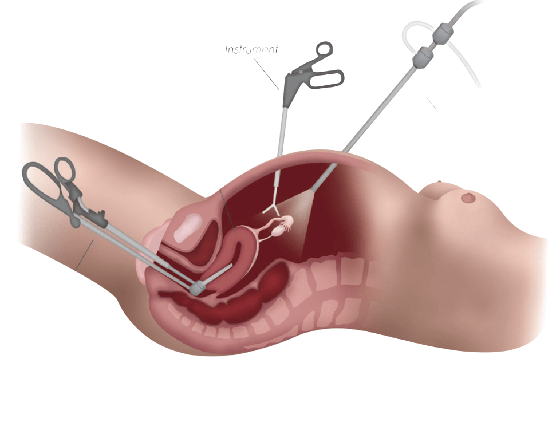Open Surgeries
LAPAROTOMY AND HYSTEROTOMY SURGERY
When it comes to addressing complex fertility issues, laparotomy and hysterotomy surgeries can play a crucial role in diagnosing and treating underlying conditions. These invasive surgical procedures are performed by fertility specialists to provide effective solutions for individuals and couples facing challenges on their path to parenthood.

CONSULTATION AND EXPERT EVALUATION
Seeking Professional Guidance: Importance of a Gynescope Specialist Hospital
Considering laparotomy or hysterotomy surgery for fertility treatment requires consultation with a qualified fertility specialist. Our specialists have the expertise to assess individual cases, evaluate medical history, perform necessary diagnostic tests, and determine the most appropriate surgical approach.
Comprehensive Evaluation: Assessing Medical History and Diagnostic Findings
During the consultation, our fertility specialist will conduct a thorough evaluation, including a review of medical history, physical examinations, and diagnostic tests. This evaluation helps identify any underlying conditions that may require surgical intervention and guides the decision-making process.
Tailored Treatment Plans: Individualizing Surgical Approaches
Based on the evaluation results, our fertility specialist will discuss the findings with the patient and develop a personalized treatment plan. This may involve either laparotomy or hysterotomy surgery, depending on the specific fertility issue, its severity, and the patient's overall health.
Shared Decision-Making: Understanding the Risks and Benefits
Before proceeding with any surgical procedure, it is crucial to engage in shared decision-making with the fertility specialist. This involves a thorough discussion of the potential risks, benefits, and alternatives. It is important to have a clear understanding of the surgical options, recovery expectations, and the potential impact on fertility outcomes.
LAPAROTOMY SURGERY
laparotomy surgery is an open abdominal surgical procedure that involves making a larger incision in the abdomen to gain direct access to the reproductive organs. It is typically recommended for cases that require a more extensive exploration and treatment.
Indications for Hysterotomy Surgery in Fertility Treatment

Treating Uterine Abnormalities
Hysterotomy surgery allows for the removal of uterine fibroids, polyps, or the correction of a uterine septum. Fibroids are non-cancerous growths that can distort the uterine cavity and hinder implantation. Polyps, on the other hand, are small, benign growths that can also interfere with embryo implantation. Additionally, a uterine septum refers to a malformation where the uterus is divided by a wall of tissue, which can affect embryo implantation and increase the risk of miscarriage. Hysterotomy surgery aims to address these abnormalities, improve the uterine environment, and enhance fertility prospects.

The Procedure: Gaining Access to the Uterus
Hysterotomy surgery is performed under general anesthesia. The surgeon makes an incision in the lower abdomen to access the uterus directly. Depending on the specific condition being treated, the surgeon may remove fibroids or polyps, or surgically correct the uterine septum. The incision is carefully closed, and the patient is closely monitored during the recovery phase.

Recovery and Post-Operative Care
After hysterotomy surgery, patients can expect a recovery period that typically lasts a few weeks. It is common to experience some abdominal discomfort, mild cramping, and spotting. Pain medication and instructions for post-operative care will be provided to manage any discomfort and promote healing. It is important to follow the surgeon's guidelines regarding rest, physical activity, and any necessary restrictions during the recovery period.

Fertility Prospects and Success Rates: Optimizing Conception
By addressing uterine abnormalities through hysterotomy surgery, fertility prospects can be significantly improved. Removing fibroids or polyps, or correcting a uterine septum, creates a more favorable environment for embryo implantation and subsequent pregnancy. The success rates of hysterotomy surgery vary depending on the specific condition being treated, the individual's overall health, and other factors. However, the surgery offers promising possibilities for couples struggling with fertility challenges related to uterine abnormalities.
GYNESCOPE
Contact Us
Call: +234 816 659 3030
Email: gynescope@yahoo.com
Address: G.U Ake Rd 22/23
Newsletter
© 2023 Gynescope All Rights Reserved



